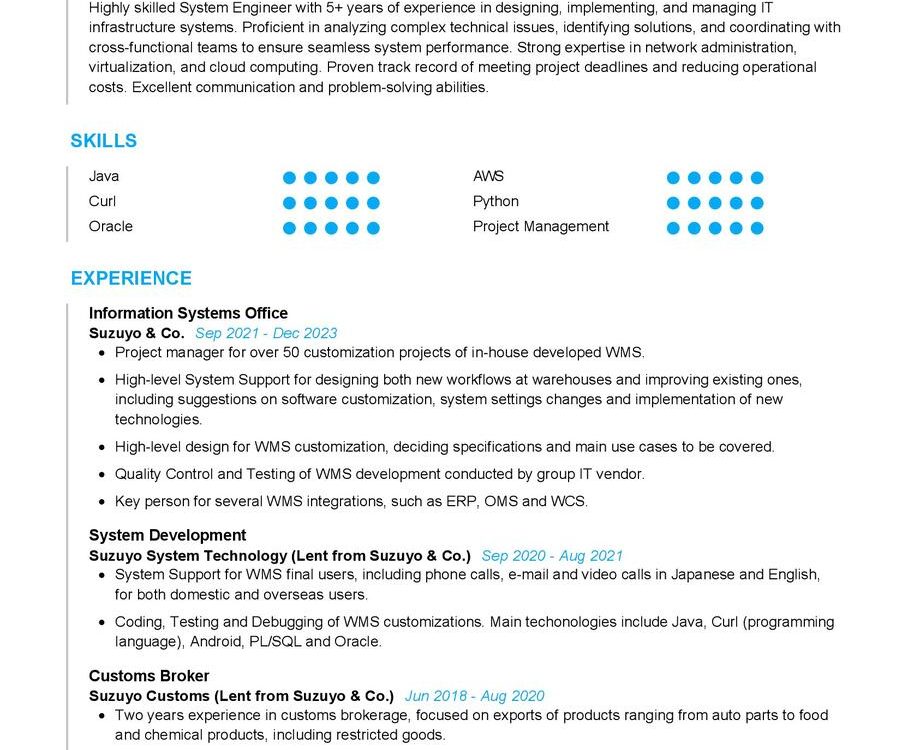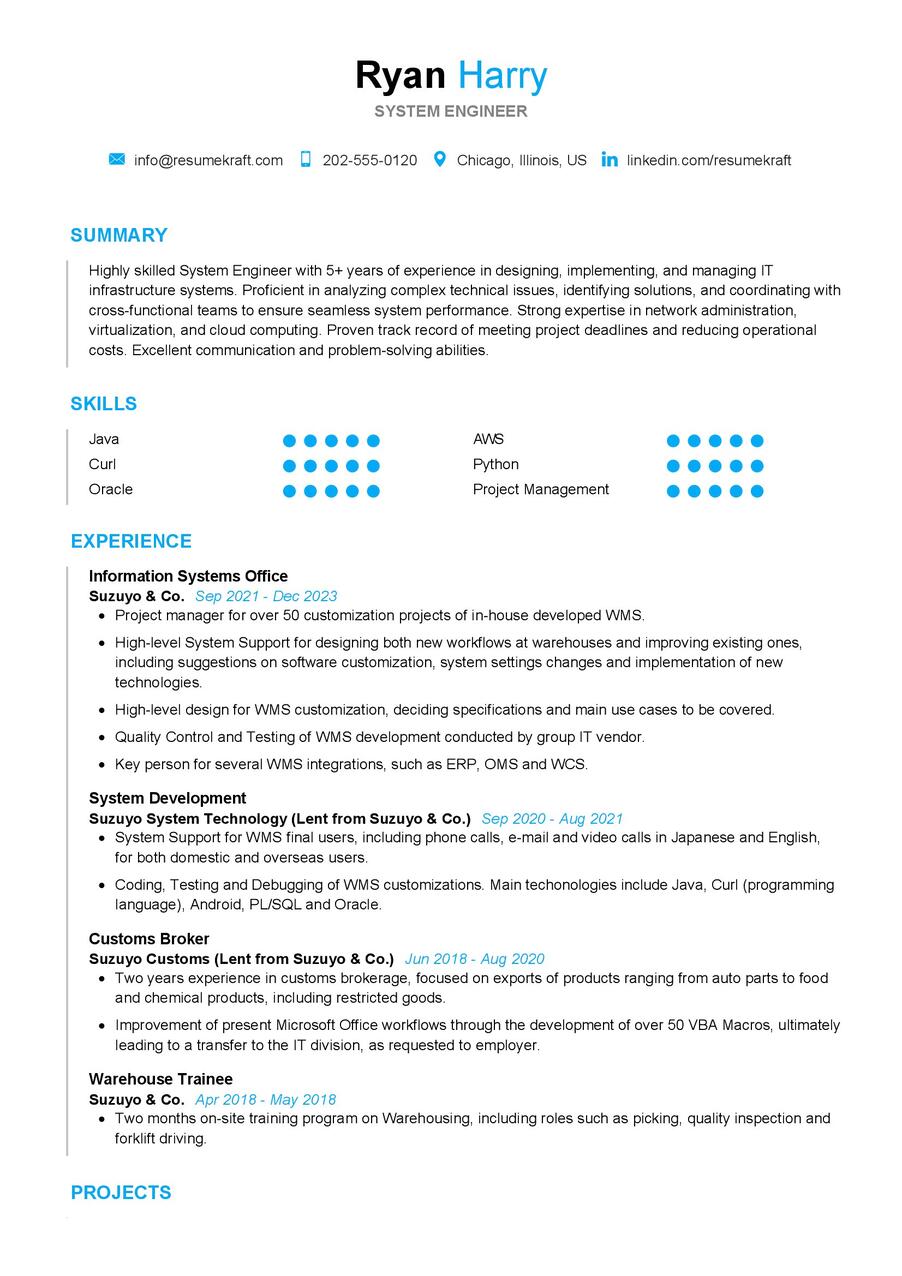Exploring the Role of a System Engineer
In the ever-evolving landscape of information technology, the position of a System Engineer has become indispensable for organizations seeking seamless and efficient technological solutions. This role demands a unique blend of technical prowess and problem-solving skills, making System Engineers the backbone of IT infrastructure. Let’s delve into the multifaceted role of a System Engineer, understanding the key responsibilities and qualifications required to excel in this dynamic field.
Qualifications for a System Engineer
Embarking on the journey to become a System Engineer requires a specific set of qualifications and skills. Here’s a detailed look at the prerequisites to step into this role:
- A Bachelor’s or Master’s degree in Computer Science, Information Technology, or a related field, laying the foundation for a deep understanding of systems and networks.
- Proficiency in operating systems, such as Windows, Linux, and Unix, showcasing a versatile skill set.
- Hands-on experience in system administration, demonstrating the ability to manage and maintain complex IT environments.
- Strong knowledge of networking protocols, ensuring efficient communication between different components of a system.
- Problem-solving skills, the ability to analyze complex issues and implement effective solutions.
- Scripting and programming skills, with expertise in languages like Python, PowerShell, or Bash, streamlining automation processes.
- Effective communication skills, as System Engineers often need to collaborate with cross-functional teams and convey technical information to non-technical stakeholders.
Securing additional certifications in relevant technologies, such as Cisco Certified Network Associate (CCNA) or Microsoft Certified: Azure Administrator Associate, can further enhance your profile in the competitive job market.
Roles and Responsibilities of a System Engineer
The role of a System Engineer is diverse and dynamic, encompassing various responsibilities to ensure the smooth functioning of an organization’s IT infrastructure. Here are the key duties associated with this role:
- Designing, implementing, and maintaining computer systems and networks to meet organizational requirements.
- Conducting regular system upgrades and ensuring the security and integrity of data.
- Collaborating with software developers to integrate new applications into existing systems.
- Troubleshooting hardware and software issues, providing timely solutions to minimize downtime.
- Monitoring system performance and optimizing configurations for optimal efficiency.
- Implementing backup and recovery procedures to safeguard critical data.
- Ensuring compliance with industry standards and best practices in system administration.
Each responsibility requires a strategic approach and a keen eye for detail, making System Engineers pivotal in maintaining a robust IT infrastructure.
Crafting an Impactful System Engineer Resume
Your System Engineer resume is your professional narrative, showcasing your qualifications, skills, and experiences. Here are some tips to craft a compelling resume that stands out:
- Highlight your hands-on experience in system administration, detailing specific projects and their outcomes.
- Showcase your problem-solving skills by providing examples of challenges faced and solutions implemented.
- Quantify your achievements with metrics, emphasizing the impact of your contributions to system efficiency and reliability.
- List relevant certifications and training programs, demonstrating your commitment to continuous learning in the ever-evolving field of IT.
- Customize your resume for each application, aligning your skills and experiences with the specific requirements of the job.
Remember, your resume is your first impression on potential employers, so make it a powerful reflection of your capabilities as a System Engineer.
System Engineer Resume Summary Examples
Your resume summary is the gateway to your professional story. Craft a compelling summary that encapsulates your skills and experiences. Here are some examples to inspire you:
- “Experienced System Engineer with a proven track record in optimizing IT infrastructure for efficiency and reliability. Proficient in system administration and troubleshooting, adept at implementing innovative solutions.”
- “Detail-oriented System Engineer with a background in designing and maintaining complex computer systems. Skilled in network management and system optimization, dedicated to ensuring seamless operations.”
- “Results-driven System Engineer with expertise in implementing backup and recovery strategies. Strong problem-solving skills and a commitment to staying updated with the latest technologies in the IT landscape.”
Your summary sets the tone for your resume, so make it impactful and tailored to the unique value you bring as a System Engineer.
Building Your System Engineer Experience Section
Your experience section is the heart of your resume, narrating the story of your professional journey. Here are examples to guide you in presenting your experiences effectively:
- “Led system upgrade projects, resulting in a 30% improvement in overall system performance and a significant reduction in downtime.”
- “Collaborated with software development teams to integrate new applications, enhancing overall organizational efficiency by streamlining processes.”
- “Managed system security protocols, ensuring compliance with industry standards and successfully mitigating potential security risks.”
Each experience listed should highlight your contributions, showcasing the tangible impact you’ve had on the IT systems you’ve managed.
Education Section for Your System Engineer Resume
Your educational background serves as the foundation for your career. Present your academic achievements in a clear and concise manner:
- Master of Science in Computer Science, XYZ University, 2017.
- Bachelor of Technology in Information Technology, ABC College, 2015.
- CompTIA A+ Certification, demonstrating proficiency in IT fundamentals, 2016.
Each educational qualification is a testament to your knowledge and expertise, reinforcing your credibility as a System Engineer.
Key Skills for a System Engineer Resume
Your skill set is a valuable asset in your role as a System Engineer. Highlight both technical and soft skills that make you a well-rounded professional:
Technical Skills:
- System Administration
- Network Management
- Scripting and Automation
- Security Protocols
- Operating Systems (Windows, Linux, Unix)
Soft Skills:
- Problem-solving
- Effective Communication
- Team Collaboration
- Attention to Detail
- Adaptability
Each skill you possess contributes to your effectiveness as a System Engineer, showcasing your ability to navigate both technical and interpersonal aspects of the role.
Common Mistakes to Avoid in Your System Engineer Resume
When crafting your resume, steer clear of common pitfalls that could hinder your chances of landing your dream job. Here are some mistakes to avoid:
- Using generic terminology without highlighting your unique qualifications for the role.
- Focusing solely on job duties instead of showcasing your achievements and contributions to each role.
- Underestimating the importance of a cover letter, a valuable tool for expressing your motivation and suitability for the position.
- Overloading your resume with technical jargon that may be unclear to non-technical hiring managers.
- Neglecting to proofread, which could leave a negative impression on potential employers.
Avoiding these mistakes ensures your resume effectively communicates your value as a System Engineer.
Key Takeaways for Your System Engineer Resume
As you wrap up your System Engineer resume, remember these key takeaways to create a standout application:
- Highlight your hands-on experience and problem-solving skills to showcase your ability to manage complex IT systems.
- Quantify your achievements with metrics, emphasizing the tangible impact of your contributions.
- Customize your resume for each application, aligning your skills with the specific requirements of the job.
- Include relevant certifications and training programs, showcasing your commitment to continuous learning.
Craft a resume that not only reflects your technical expertise but also resonates with the unique value you bring as a System Engineer.
Finally, feel free to utilize resources like AI Resume Builder, Resume Design, Resume Samples, Resume Examples, Resume Skills, Resume Help, Resume Synonyms, and Job Responsibilities to create a standout application and prepare for the System Engineer job interview.
Armed with these insights and tips, you are now ready to craft a resume that is a true reflection of your journey, your skills, and your aspirations. Best of luck!


